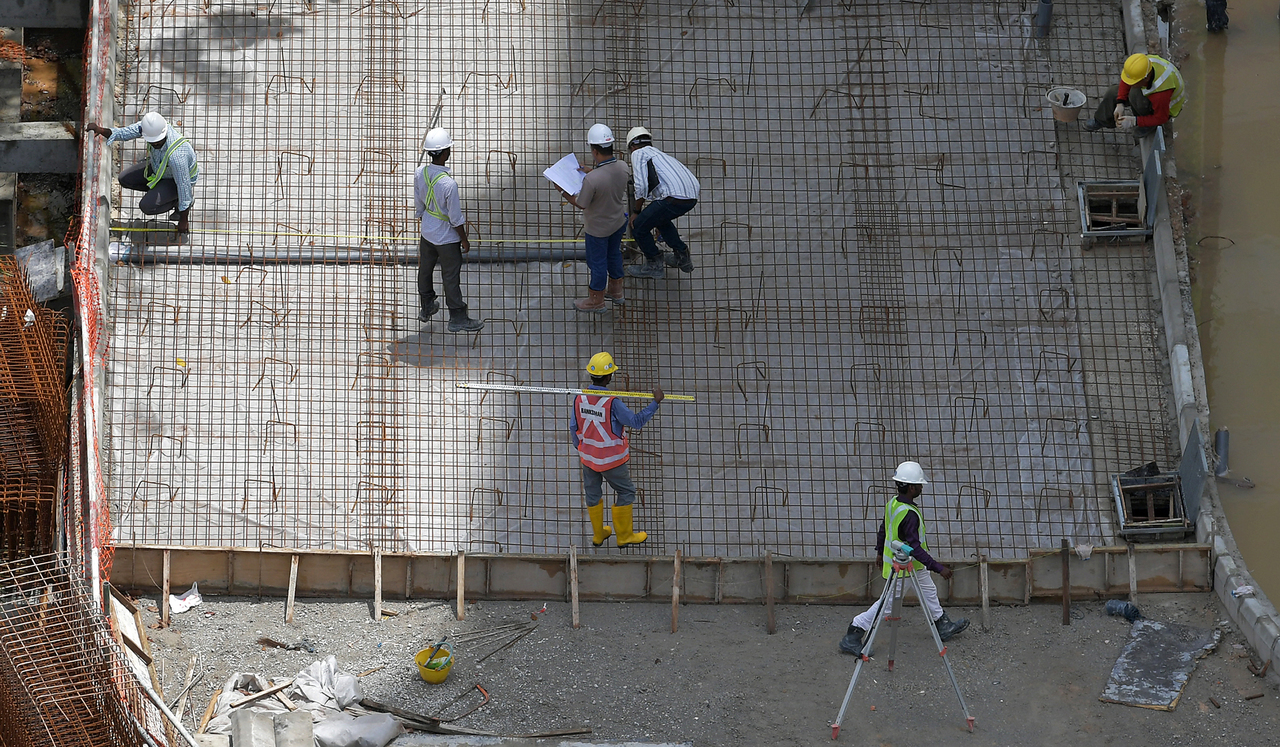Why Singapore cannot cut down on foreign workers the way other countries have
Sign up now: Get ST's newsletters delivered to your inbox

Singapore cannot cut down on foreign workers because of its small size and lack of natural resources.
ST PHOTO: KUA CHEE SIONG
SINGAPORE - Is Singapore prepared to have 2,500 babies born here every year grow up to be construction workers?
Trade and Industry Minister Chan Chun Sing gave this stark number - which works out to around 8 per cent of the 33,000 babies born every year - to show what has to happen if Singapore were to cut down on foreign workers.
Elaborating on this hypothetical scenario during a virtual press conference on Saturday (May 30), he sketched a scene in which Singapore has 300,000 foreign construction workers, and where each Singaporean is thrice as productive as a foreign worker.
In theory, this would mean the 300,000 foreign workers could be replaced with 100,000 Singaporeans, who could each be paid thrice as much as a foreign worker.
Assuming every worker works for 40 years without dropping out, this would mean that every year, 2,500 babies would have to be designated as construction workers.
"Do you think you'll be recruiting, at every cohort of Singaporean babies, about 6 to 8 per cent of them into the construction industry?" asked Mr Chan.
"I think realistically, our Singaporean children... want a diversity of jobs," he said, adding that he did not mean that nobody wants to enter the construction industry.
He said Singapore cannot cut down on foreign workers the way some other countries have because of its small size and lack of natural resources.
He was addressing a query on why Singapore could not redesign its economy in a manner that would allow it to reduce its reliance on low-wage foreign workers.
Mr Chan said: "It's not so much why people can do it and we cannot do it. The fundamental question is... what proportion of our labour force is prepared to do a job in this sector?"
He noted that in many other countries, a proportion of local workers is allocated to the construction industry.
In some cases, this leads to these workers becoming more expensive, and in other cases, projects take much longer to complete due to the lack of manpower.
Some other countries can sustain themselves using their domestic demand due to their size, but this is not the case for Singapore, he said.
Mr Chan said: "You might ask me the question, what's the big deal, why don't we build slower, why must we build so fast...
"I think the answer to that is quite obvious. For a small country without natural resources, we compete on the basis that we are a good place for people to do business. If we lose out in that relative game compared to other people, then unfortunately, I think the future of Singapore will not be what we expect it to be."
Another issue raised at the press conference was that of increased anti-globalisation sentiment across the world in the wake of Covid-19.
Asked whether Singapore could keep some production lines at home - so that they are protected in the event of another pandemic - instead of having them outsourced, Mr Chan said that Singapore cannot shut itself off from globalisation, as it would not be possible for the Republic to survive without trade.
He added that even though Singapore can produce some things domestically, it does not have many natural resources and is still dependent on a foreign supply of materials.
He said: "Even to produce eggs - where do eggs come from? You will probably tell me hens. But where does that chicken come from? Don't tell me eggs... the chickens all come from day old chicks, and in this part of the world there are only one or two critical suppliers...
"(And) if the chicken doesn't peck on limestone, there'll be no eggs, because you need calcium."
So instead of turning away from international trade, the key is for Singapore to position itself as a critical part of the supply chain and leverage on its competitive advantages in production, so it will have something to trade even in the worst of times, said Mr Chan.
He added: "For us, resilience means diversity and interdependence, (it) doesn't mean autarky and independence. That would be the wrong conclusion to make."
Asked whether Singapore could keep some production lines at home - so that they are protected in the event of another pandemic - instead of having them outsourced, Mr Chan said that Singapore cannot shut itself off from globalisation, as it would not be possible for the Republic to survive without trade.
He added that even though Singapore can produce some things domestically, it does not have many natural resources and is still dependent on a foreign supply of materials.
He said: "Even to produce eggs - where do eggs come from? You will probably tell me hens. But where does that chicken come from? Don't tell me eggs... the chickens all come from day old chicks, and in this part of the world there are only one or two critical suppliers...
"(And) if the chicken doesn't peck on limestone, there'll be no eggs, because you need calcium."
So instead of turning away from international trade, the key is for Singapore to position itself as a critical part of the supply chain and leverage on its competitive advantages in production, so it will have something to trade even in the worst of times, said Mr Chan.
He added: "For us, resilience means diversity and interdependence, (it) doesn't mean autarky and independence. That would be the wrong conclusion to make."


